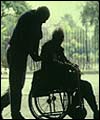| 'Aging' or 'ageing'? What to do with '-ing' when forming the participle |
 |
||||||
| Jean-Pierre
Michel from Belgium asks: I would like to know which form is correct. I have seen both aging and ageing written and would be grateful to know which is right. |
| Roger replies: | ||
| The
answer is that both are correct! Ageing is the form that is
more commonly found, although aging is occasionally used. The
norm, of course, is to drop the final 'e' when forming the participle:
Rage becomes raging as in: 'The storm was raging.'
|
||||
| In
a survey carried out in Britain, 1000 people aged between 16 and 65-plus
were asked to spell commonly misspelt words. Among those aged over
65, 20% spelt seven or more of the words correctly, while for those
aged between 16 and 24, the figure was just 8%! I have reproduced those ten most commonly misspelt words in the quiz below so that you can try your hand at getting them right. |
||||
Type in what
you think is the correct spelling and then check your answers in
the key beneath. 1. There was
no room in the hotel, so they were
at the bed-and- breakfast nearby. 2. The skiing
holiday was
Ben and Tom both fell ill with food poisoning and I broke my leg
the first day out on the slopes. 3. She is such
a witty and
person. I couldn't stop laughing when we had supper with her last
week. 4. I wonder
whether you will be doing this quiz before the old
ends or after the new
has begun. 5. The schoolboys
were more than just
Putting a live crab down someone's trousers goes beyond a joke. 6. Being invited
to the Holy Land to take part in the Christmas Day celebrations
was a great
. 7. English people
often find the
of French difficult. 8. It was not
possible to
the Siamese twins. They were joined together for life. 9. It was such
a nice
to find you at home when I got back from work. I wasn't expecting
you till the weekend. 10. His behaviour
was really
. He was walking down the street, muttering and chuckling to himself.
1.
They were accommodated in the bed-and-breakfast. |
||||||||